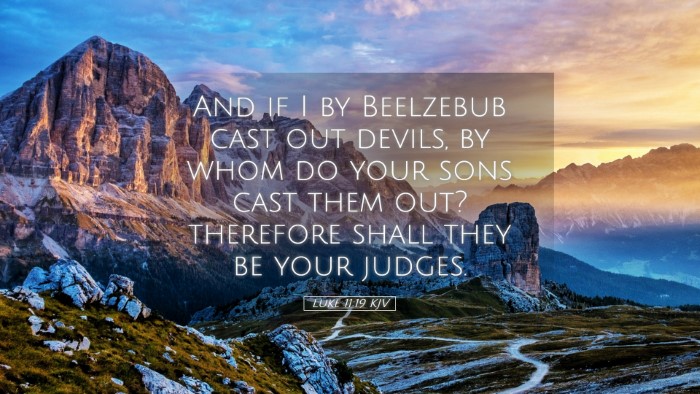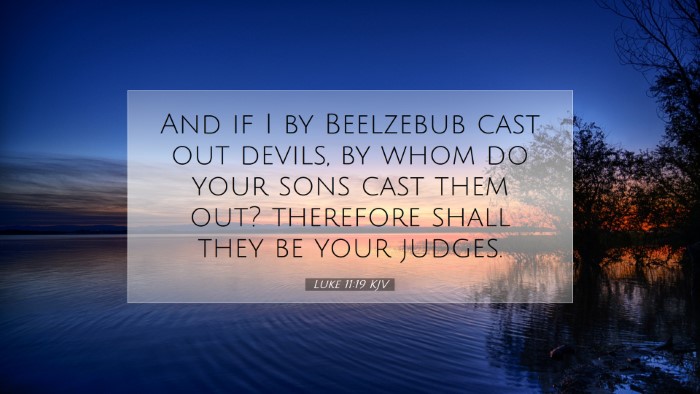Exegesis and Commentary on Luke 11:19
Verse: "And if I cast out devils by Beelzebub, by whom do your sons cast them out? therefore shall they be your judges."
Contextual Background
This verse is situated in a larger discourse where Jesus addresses accusations made against Him regarding His authority to cast out demons. The Pharisees claimed that His power came from Beelzebub, the prince of demons. This situation sets the stage for a significant discussion about the source of spiritual power and the nature of spiritual authority.
Commentary Insights
1. Matthew Henry's Commentary
Matthew Henry emphasizes the irony in the Pharisees' accusation. He observes that by their reasoning, Jesus is suggesting a self-destructive logic: "If I am empowered by Beelzebub to do good, it contradicts the very nature of my work." He points out that the notion of casting out demons while being associated with the prince of demons is absurd. Furthermore, Henry highlights that this assertion of the Pharisees reflects their spiritual blindness and refusal to acknowledge the evident work of God through Christ.
2. Albert Barnes' Notes on the Bible
Barnes expands on the implications of Jesus’ rhetorical question. He notes, "By whom do your sons cast them out?" which invites a reflection on the practices of the Pharisees’ own disciples who were known to practice exorcisms. Barnes argues that if they admit these acts are valid, they must reconcile this with their condemnation of Jesus. This rhetorical question implies that the judgement of the Pharisees would return upon them, illustrating a common biblical theme of hypocrisy. Barnes stresses that any judgment against Jesus would only serve to reveal their own failings.
3. Adam Clarke's Commentary
Clarke delves into the implications of the term "Beelzebub," explaining its origins in pagan worship and its application among the Jews as a name for the prince of devils. Clarke elucidates that this accusation not only diminishes the character of Jesus but also places celestial beings in opposition, which is contrary to the nature of God’s kingdom. He remarks that a kingdom divided against itself cannot stand, and thus, if Jesus were indeed casting out demons by Beelzebub, it would ultimately destroy the work of the devil, a contradiction. Clarke asserts that the phrase emphasizes the unity and sovereignty of God's nature in the spiritual realm.
Theological Implications
This verse provides rich theological insight into the nature of demonic activity and the authority of Christ. It raises critical questions about spiritual discernment and prophetic legitimacy within the community:
- Spiritual Authority: The authority to cast out demons is portrayed as stemming from alignment with God rather than affiliation with evil. This delineation is crucial for understanding Christian authority.
- Judgment and Accountability: The text implies a profound principle of accountability regarding spiritual leadership and prophetic calling. Leaders must hold themselves to the same standards they impose on others.
- Division vs. Unity: Clarke's assertion about the implications of division within the kingdom applies not only to the spiritual realm but also to church unity. A divided church undermines its credibility in ministry.
Applications for Pastors and Theologians
This verse holds significant lessons for pastors and theologians as they navigate their roles in ministry:
- Examine Sources of Authority: Leaders should continually assess the source of their ministerial power and ensure it aligns with the evidence of God's active work.
- Discernment in Leadership: It is essential for church leaders to maintain a critical eye toward their own practices and teachings, ensuring they do not fall into the trap of hypocrisy exemplified by the Pharisees.
- Fostering Unity: The call for unity in the face of external scrutiny is paramount. Unity among leaders and congregants fortifies the effectiveness of ministry and witness in society.
Conclusion
In conclusion, Luke 11:19 serves as a pivotal assertion regarding the legitimacy of Jesus’ ministry and the dangerous repercussions of misattributing divine power to evil forces. Public domain commentaries shed light on the intricacies of this passage, presenting it as essential for understanding the nature of Christ's mission and the church's ongoing work in the world. The implications for theological reflection and pastoral practice are immense, encouraging a return to the foundational aspects of spiritual authority and integrity.


